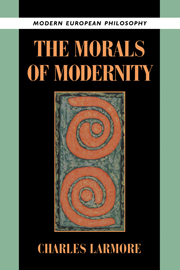Book contents
- Frontmatter
- Contents
- Acknowledgments
- Introduction
- I Modern Ethics
- II Beyond Naturalism
- III Liberalism and Modernity
- 6 Political Liberalism
- 7 Pluralism and Reasonable Disagreement
- 8 Carl Schmitt's Critique of Liberal Democracy
- 9 Modernity and the Disunity of Reason
- 10 The Foundations of Modern Democracy: Reflections on Jürgen Habermas
- Index
9 - Modernity and the Disunity of Reason
Published online by Cambridge University Press: 18 December 2009
- Frontmatter
- Contents
- Acknowledgments
- Introduction
- I Modern Ethics
- II Beyond Naturalism
- III Liberalism and Modernity
- 6 Political Liberalism
- 7 Pluralism and Reasonable Disagreement
- 8 Carl Schmitt's Critique of Liberal Democracy
- 9 Modernity and the Disunity of Reason
- 10 The Foundations of Modern Democracy: Reflections on Jürgen Habermas
- Index
Summary
One of the enduring concerns of modern thought has been the nature of modernity itself. Since the sixteenth century fundamental shifts in orientation have transformed religion, science, ethics, and art. These changes have seemed connected with the emerging features of modern society – technological progress, capitalism, liberal democracy. But in addition, modern thought has been from the beginning characteristically self-reflective. The cultural and social transformations of the modern age have often been driven and absorbed by the image modern thought has projected of itself as having broken decisively with the outlook of former times. Today this self-image surely seems too stark, and yet a new sense of continuity with the past is itself part of modernity's ongoing reflection upon itself.
During the nineteenth century modernity was often regarded as an age of transition. In thinkers otherwise as diverse as Chateaubriand, Comte, Mill, and Arnold there recurs the view that modern times are a troubled interregnum between one epoch of order (the Middle Ages) and another yet to come. The delayed arrival of the new order was seen as a burden to be met with intellectual courage, as when Arnold described himself as “wandering between two worlds, one dead, the other powerless to be born.” This view, too, seems not very attractive. Not only has the new age of faith still not come, but the pace of transformation, the creation of conditions setting us off from the past, has accelerated.
- Type
- Chapter
- Information
- The Morals of Modernity , pp. 189 - 204Publisher: Cambridge University PressPrint publication year: 1996



